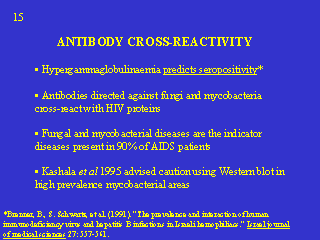

 Slide 15 of 24
Slide 15 of 24








|

|
Antibodies are no more than big chemicals. And like all chemicals they can react with a range of other chemicals. Maybe a narrow range compared to the million chemicals known to exist but nonetheless antibodies are far from monogamous. Antibodies are also called gamma globulins and the more antibodies you have the more the chance there will be a reaction outside whatever caused the antibody in the first place. And despite being immune deficient AIDS patients have a plethora of antibodies. So positive HIV tests could be caused by antibodies which have a chemical but no biological or causative relationship with the proteins in the antibody tests. There is certainly no evidence to counter this possibility.
|